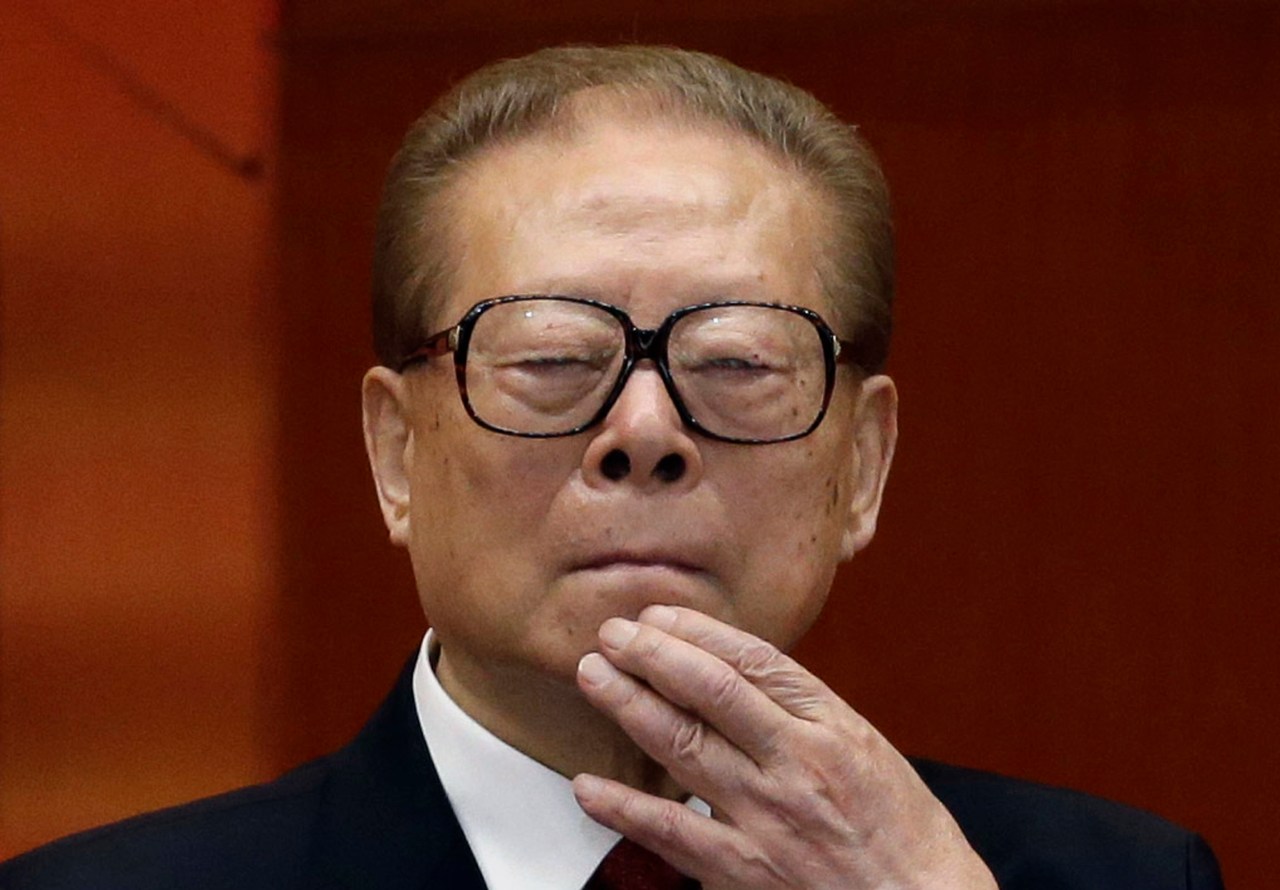Song Hong
SENIOR MEMBER

- Joined
- Jan 4, 2020
- Messages
- 5,058
- Reaction score
- -25
- Country
- Location
中国共产党中央委员会、中华人民共和国全国人民代表大会常务委员会、中华人民共和国国务院、中国人民政治协商会议全国委员会、中国共产党和中华人民共和国中央军事委员会,极其悲痛地向全党全军全国各族人民通告:我们敬爱的江泽民同志患白血病合并多脏器功能衰竭,抢救无效,于2022年11月30日12时13分在上海逝世,享年96岁。
江泽民同志是我党我军我国各族人民公认的享有崇高威望的卓越领导人,伟大的马克思主义者,伟大的无产阶级革命家、政治家、军事家、外交家,久经考验的共产主义战士,中国特色社会主义伟大事业的杰出领导者,党的第三代中央领导集体的核心,“三个代表”重要思想的主要创立者。
江泽民同志从青少年时代起就勤奋学习,追求真理,受到爱国主义思想和民主革命思想的启蒙。在大学学习期间,经过积极参加抗日爱国活动洗礼,江泽民同志形成了马克思主义世界观,完成了人生道路的选择,最终确立了为民族解放、人民幸福而奋斗的人生理想和信仰。一九四七年从上海交通大学毕业后,江泽民同志到工厂工作,在工人群众中并在青年会夜校职业青年中从事革命宣传工作,一九四九年组织工人群众开展护厂活动,迎接上海解放。
中华人民共和国成立初期,江泽民同志先后担任上海益民食品一厂第一副厂长、上海制皂厂第一副厂长、第一机械工业部上海第二设计分局电器专业科科长等职。一九五四年,国家在长春兴建第一汽车制造厂,需要大批专业技术干部和管理干部,江泽民同志应调前往,一九五五年赴苏联莫斯科斯大林汽车制造厂实习。一九五六年回国后,江泽民同志任长春第一汽车制造厂动力处副处长、副总动力师、动力分厂厂长。一九六二年,江泽民同志调任第一机械工业部上海电器科学研究所副所长,负责该所科研领导工作。一九六六年,江泽民同志调任武汉热工机械研究所所长、代理党委书记,后任党委书记,组织原子能发电设备设计工作。“文化大革命”开始后,江泽民同志受到冲击。一九七〇年,江泽民同志调到第一机械工业部工作,一九七一年任中国第一机械工业部派驻罗马尼亚专家组总组长,一九七三年回国先后任第一机械工业部外事局副局长、局长。一九八〇年,江泽民同志担任国家进出口管理委员会、国家外国投资管理委员会副主任兼秘书长、党组成员,主管实施广东、福建两省实行特殊政策、灵活措施和试办经济特区等开创性工作。一九八二年,江泽民同志任电子工业部第一副部长、党组副书记,一九八三年任部长、党组书记,为我国电子工业发展作出了重要贡献。一九八二年九月,江泽民同志在党的第十二次全国代表大会上当选为中央委员。
一九八五年,江泽民同志任上海市市长、中共上海市委副书记。一九八七年,江泽民同志在党的十三届一中全会上当选为中共中央政治局委员,并任中共上海市委书记。担任上海市长、市委书记期间,江泽民同志带领上海广大干部群众振奋精神、勇于探索,推动上海改革开放和社会主义现代化建设取得重大突破,浦东开发开放蓄势谋篇,推动党的建设、精神文明建设、社会建设取得重大进步。一九八九年春夏之交我国发生严重政治风波,江泽民同志拥护和执行党中央关于旗帜鲜明反对动乱、捍卫社会主义国家政权、维护人民根本利益的正确决策,紧紧依靠广大党员、干部、群众,有力维护上海稳定。
一九八九年,在党的十三届四中全会上,江泽民同志当选为中共中央政治局常委、中央委员会总书记。同年,党的十三届五中全会决定江泽民同志为中共中央军事委员会主席。一九九〇年,在七届全国人大三次会议上当选为中华人民共和国中央军事委员会主席。
江泽民同志是党的第三代中央领导集体的核心。二十世纪八十年代末九十年代初,国际国内发生严重政治风波,世界社会主义出现严重曲折,我国社会主义事业发展面临空前巨大的困难和压力。在这个决定党和国家前途命运的重大历史关头,江泽民同志带领党的中央领导集体,紧紧依靠全党全军全国各族人民,旗帜鲜明坚持四项基本原则,维护国家独立、尊严、安全、稳定,毫不动摇坚持经济建设这个中心,坚持改革开放,捍卫了中国特色社会主义伟大事业,打开了我国改革开放和社会主义现代化建设新局面。
从党的十三届四中全会到党的十六大的十三年中,国际形势风云变幻,我国改革开放和社会主义现代化建设进程波澜壮阔。在国际国内十分复杂的形势下,江泽民同志带领党的中央领导集体,高举马克思列宁主义、毛泽东思想、邓小平理论伟大旗帜,坚持党的基本路线不动摇,团结全党全国各族人民,抓住机遇、深化改革、扩大开放、促进发展、保持稳定,确立了社会主义市场经济体制的改革目标和基本框架,确立了社会主义初级阶段公有制为主体、多种所有制经济共同发展的基本经济制度和按劳分配为主体、多种分配方式并存的分配制度,制定和实施了促进改革发展稳定的一系列方针政策和重大战略,锐意推进经济体制改革、政治体制改革、文化体制改革和其他各方面改革,开创全面改革开放新局面,实施依法治国基本方略,坚持“和平统一、一国两制”的方针,实现香港、澳门顺利回归,坚持独立自主的和平外交政策,打开外交工作崭新局面,推进党的建设新的伟大工程,推动社会主义物质文明、政治文明、精神文明建设取得举世瞩目的新进展,成功把中国特色社会主义推向二十一世纪。在以江泽民同志为核心的党的第三代中央领导集体领导下,我们从容应对一系列关系我国主权和安全的国际突发事件,战胜在政治、经济领域和自然界出现的困难和风险,保证了改革开放和社会主义现代化建设的航船始终沿着正确方向破浪前进。党的十三届四中全会以来十三年我们党和国家取得的巨大成就,同江泽民同志作为马克思主义政治家的雄才大略、关键作用、高超政治领导艺术是分不开的。
江泽民同志担任中央军事委员会主席期间,深刻洞察和把握国内外形势的重大变化和世界新军事变革的发展趋势,对加强国防和军队现代化建设提出了一系列新论断新举措,丰富和发展了毛泽东军事思想和邓小平新时期军队建设思想,创立了江泽民国防和军队建设思想,领导国防和军队现代化建设取得了巨大成就。江泽民同志强调,要坚持国防建设与经济建设协调发展的方针,加强人民军队革命化、现代化、正规化建设;按照政治合格、军事过硬、作风优良、纪律严明、保障有力的总要求,紧紧围绕打得赢、不变质两个历史性课题,全面推进人民军队建设;毫不动摇坚持党对人民军队的绝对领导,始终把思想政治建设摆在我军各项建设的首位,永葆人民军队性质、本色、作风;贯彻积极防御的军事战略方针,推进中国特色军事变革,按照建设信息化军队、打赢信息化战争的目标,坚定不移走中国特色的精兵之路,实现我军现代化跨越式发展;实施科技强军战略,坚持从严治军、依法治军、勤俭建军,探索新的历史条件下治军的特点和规律,与时俱进推进我军各项建设;深化国防科技工业体制改革,增强自主创新能力,加快国防科技和武器装备发展,走出一条投入较少、效益较高的军队现代化建设路子;按照平战结合、军民结合、寓军于民的方针,提高国防动员能力,发展高技术条件下人民战争的战略战术,巩固军政军民团结。这一切,对于加强国防和军队现代化建设具有长远指导意义。
江泽民同志坚持马克思主义的思想路线,尊重实践,尊重群众,准确把握时代特征,科学判断我们党所处的历史方位,围绕建设中国特色社会主义这个主题,在改革发展稳定、内政外交国防、治党治国治军等各方面都提出了一系列新思想新观点新论断,为坚持和发展党的基本理论、基本路线、基本纲领、基本经验作出了杰出贡献。特别是他集中全党智慧创立了“三个代表”重要思想,实现了党在指导思想上的又一次与时俱进,体现了一位真正马克思主义者的巨大政治勇气和理论勇气。“三个代表”重要思想突出强调我们党始终代表中国先进生产力的发展要求、代表中国先进文化的前进方向、代表中国最广大人民的根本利益,遵循了人类历史发展进步的普遍规律,顺应了时代发展潮流和我国社会发展进步要求,反映了全国各族人民利益和愿望,抓住了新形势下提高党的执政能力、巩固党的执政地位、完成党的执政使命的根本。“三个代表”重要思想最鲜明的特点和最突出的贡献,在于用一系列紧密联系、相互贯通的新思想新观点新论断,进一步回答了什么是社会主义、怎样建设社会主义的问题,创造性回答了建设什么样的党、怎样建设党的问题,是对马克思列宁主义、毛泽东思想、邓小平理论的继承和发展,深化了我们对新的时代条件下推进中国特色社会主义事业、加强党的建设的规律的认识。
江泽民同志高度重视事关党和人民事业的重大战略问题。在筹备党的十六大期间,江泽民同志主动提出,为了党和国家事业长远发展,为了党和国家长治久安,他不再担任中央领导职务,并从中央委员会退下来,以利于促进党和国家高层领导新老交替。党中央同意了江泽民同志的请求。从当时国际形势复杂多变、国防和军队建设任务繁重考虑,党的十六届一中全会决定江泽民同志留任中共中央军事委员会主席。党的十六届一中全会后,江泽民同志全力支持以胡锦涛同志为总书记的新一届中央领导集体的工作,尽心尽力履行党中央交付他的职责。二〇〇四年,江泽民同志从党和国家事业长远发展的大局出发,又主动提出辞去他担任的党和国家中央军事委员会主席的职务,充分体现了他对党和国家事业发展的深谋远虑。
从领导岗位上退下来以后,江泽民同志坚决拥护和支持党中央工作,关心中国特色社会主义伟大事业,坚定支持党风廉政建设和反腐败斗争。二〇〇六年,江泽民同志亲自主持编辑和逐篇审定《江泽民文选》第一卷、第二卷、第三卷。《江泽民文选》主要收入了江泽民同志从二十世纪八十年代末至二十一世纪初具有代表性和独创性的重要著作,为我们更深入地学习领会“三个代表”重要思想,继续推进中国特色社会主义伟大事业和党的建设新的伟大工程提供了重要教材。
江泽民同志目光远大、审时度势,总是从中国和世界发展大势、从党和国家工作全局出发观察和思考问题,不断推进理论创新和其他各方面创新。江泽民同志信念坚定、处事果断,总是把党和人民放在心中最高的位置,始终不渝坚持共产党人的理想信念,在关键时刻具有作出果敢决策的非凡胆略和进行理论创新的巨大勇气。江泽民同志尊重实践、与时俱进,总是紧紧把握时代发展脉搏和契机,坚持从党和人民活生生的实践出发总结经验、寻找路子,脚踏实地而又开拓进取推进党和国家各项工作。江泽民同志尊重群众、关心群众,总是高度关注人民群众安危冷暖,依据最广大人民根本利益来检验和推动工作。江泽民同志的优秀品格和高尚风范将永远教育和激励我们前进。
江泽民同志的逝世,对我党我军我国各族人民是不可估量的损失。党中央号召,全党全军全国各族人民化悲痛为力量,继承江泽民同志的遗志,以实际行动表达我们的悼念。
我们一定要更加自觉地团结在以习近平同志为核心的党中央周围,坚持党的基本理论、基本路线、基本方略,深刻领悟“两个确立”的决定性意义,增强“四个意识”、坚定“四个自信”、做到“两个维护”,持之以恒推进全面从严治党,深入推进新时代党的建设新的伟大工程,以党的自我革命引领社会革命,使我们党坚守初心使命,始终成为中国特色社会主义事业的坚强领导核心。
我们一定要坚持马克思列宁主义、毛泽东思想、邓小平理论、“三个代表”重要思想、科学发展观,全面贯彻习近平新时代中国特色社会主义思想,坚持把马克思主义基本原理同中国具体实际相结合、同中华优秀传统文化相结合,坚持解放思想、实事求是、与时俱进、求真务实,勇于进行理论探索和创新,在新时代的伟大实践中不断开辟马克思主义中国化时代化新境界,让当代中国马克思主义放射出更加灿烂的真理光芒。
我们一定要坚定不移坚持中国共产党领导、坚持中国特色社会主义,坚持把国家和民族发展放在自己力量的基点上、把中国发展进步的命运牢牢掌握在自己手中,团结一心为全面建成社会主义现代化强国、实现第二个百年奋斗目标而努力,以中国式现代化全面推进中华民族伟大复兴,推动构建人类命运共同体,创造人类文明新形态。
我们一定要坚持全心全意为人民服务的根本宗旨,树牢群众观点,贯彻群众路线,尊重人民首创精神,坚持一切为了人民、一切依靠人民,从群众中来、到群众中去,始终保持同人民群众的血肉联系,始终同人民同呼吸、共命运、心连心。
我们一定要努力学习“三个代表”重要思想,学习江泽民同志的革命精神和革命风范,学习他运用马克思主义立场、观点、方法研究新情况、解决新问题的科学态度和创造精神,为把我国建设成为富强民主文明和谐美丽的社会主义现代化强国而团结奋斗。
中华民族的伟大复兴事业,凝结了包括江泽民同志在内的一代又一代共产党人的心血和奋斗。前进道路上,全党全军全国各族人民要在以习近平同志为核心的党中央坚强领导下,高举中国特色社会主义伟大旗帜,全面贯彻习近平新时代中国特色社会主义思想,弘扬伟大建党精神,坚定信心、同心同德,埋头苦干、奋勇前进,为全面建设社会主义现代化国家、全面推进中华民族伟大复兴而团结奋斗。
江泽民同志是我党我军我国各族人民公认的享有崇高威望的卓越领导人,伟大的马克思主义者,伟大的无产阶级革命家、政治家、军事家、外交家,久经考验的共产主义战士,中国特色社会主义伟大事业的杰出领导者,党的第三代中央领导集体的核心,“三个代表”重要思想的主要创立者。
江泽民同志从青少年时代起就勤奋学习,追求真理,受到爱国主义思想和民主革命思想的启蒙。在大学学习期间,经过积极参加抗日爱国活动洗礼,江泽民同志形成了马克思主义世界观,完成了人生道路的选择,最终确立了为民族解放、人民幸福而奋斗的人生理想和信仰。一九四七年从上海交通大学毕业后,江泽民同志到工厂工作,在工人群众中并在青年会夜校职业青年中从事革命宣传工作,一九四九年组织工人群众开展护厂活动,迎接上海解放。
中华人民共和国成立初期,江泽民同志先后担任上海益民食品一厂第一副厂长、上海制皂厂第一副厂长、第一机械工业部上海第二设计分局电器专业科科长等职。一九五四年,国家在长春兴建第一汽车制造厂,需要大批专业技术干部和管理干部,江泽民同志应调前往,一九五五年赴苏联莫斯科斯大林汽车制造厂实习。一九五六年回国后,江泽民同志任长春第一汽车制造厂动力处副处长、副总动力师、动力分厂厂长。一九六二年,江泽民同志调任第一机械工业部上海电器科学研究所副所长,负责该所科研领导工作。一九六六年,江泽民同志调任武汉热工机械研究所所长、代理党委书记,后任党委书记,组织原子能发电设备设计工作。“文化大革命”开始后,江泽民同志受到冲击。一九七〇年,江泽民同志调到第一机械工业部工作,一九七一年任中国第一机械工业部派驻罗马尼亚专家组总组长,一九七三年回国先后任第一机械工业部外事局副局长、局长。一九八〇年,江泽民同志担任国家进出口管理委员会、国家外国投资管理委员会副主任兼秘书长、党组成员,主管实施广东、福建两省实行特殊政策、灵活措施和试办经济特区等开创性工作。一九八二年,江泽民同志任电子工业部第一副部长、党组副书记,一九八三年任部长、党组书记,为我国电子工业发展作出了重要贡献。一九八二年九月,江泽民同志在党的第十二次全国代表大会上当选为中央委员。
一九八五年,江泽民同志任上海市市长、中共上海市委副书记。一九八七年,江泽民同志在党的十三届一中全会上当选为中共中央政治局委员,并任中共上海市委书记。担任上海市长、市委书记期间,江泽民同志带领上海广大干部群众振奋精神、勇于探索,推动上海改革开放和社会主义现代化建设取得重大突破,浦东开发开放蓄势谋篇,推动党的建设、精神文明建设、社会建设取得重大进步。一九八九年春夏之交我国发生严重政治风波,江泽民同志拥护和执行党中央关于旗帜鲜明反对动乱、捍卫社会主义国家政权、维护人民根本利益的正确决策,紧紧依靠广大党员、干部、群众,有力维护上海稳定。
一九八九年,在党的十三届四中全会上,江泽民同志当选为中共中央政治局常委、中央委员会总书记。同年,党的十三届五中全会决定江泽民同志为中共中央军事委员会主席。一九九〇年,在七届全国人大三次会议上当选为中华人民共和国中央军事委员会主席。
江泽民同志是党的第三代中央领导集体的核心。二十世纪八十年代末九十年代初,国际国内发生严重政治风波,世界社会主义出现严重曲折,我国社会主义事业发展面临空前巨大的困难和压力。在这个决定党和国家前途命运的重大历史关头,江泽民同志带领党的中央领导集体,紧紧依靠全党全军全国各族人民,旗帜鲜明坚持四项基本原则,维护国家独立、尊严、安全、稳定,毫不动摇坚持经济建设这个中心,坚持改革开放,捍卫了中国特色社会主义伟大事业,打开了我国改革开放和社会主义现代化建设新局面。
从党的十三届四中全会到党的十六大的十三年中,国际形势风云变幻,我国改革开放和社会主义现代化建设进程波澜壮阔。在国际国内十分复杂的形势下,江泽民同志带领党的中央领导集体,高举马克思列宁主义、毛泽东思想、邓小平理论伟大旗帜,坚持党的基本路线不动摇,团结全党全国各族人民,抓住机遇、深化改革、扩大开放、促进发展、保持稳定,确立了社会主义市场经济体制的改革目标和基本框架,确立了社会主义初级阶段公有制为主体、多种所有制经济共同发展的基本经济制度和按劳分配为主体、多种分配方式并存的分配制度,制定和实施了促进改革发展稳定的一系列方针政策和重大战略,锐意推进经济体制改革、政治体制改革、文化体制改革和其他各方面改革,开创全面改革开放新局面,实施依法治国基本方略,坚持“和平统一、一国两制”的方针,实现香港、澳门顺利回归,坚持独立自主的和平外交政策,打开外交工作崭新局面,推进党的建设新的伟大工程,推动社会主义物质文明、政治文明、精神文明建设取得举世瞩目的新进展,成功把中国特色社会主义推向二十一世纪。在以江泽民同志为核心的党的第三代中央领导集体领导下,我们从容应对一系列关系我国主权和安全的国际突发事件,战胜在政治、经济领域和自然界出现的困难和风险,保证了改革开放和社会主义现代化建设的航船始终沿着正确方向破浪前进。党的十三届四中全会以来十三年我们党和国家取得的巨大成就,同江泽民同志作为马克思主义政治家的雄才大略、关键作用、高超政治领导艺术是分不开的。
江泽民同志担任中央军事委员会主席期间,深刻洞察和把握国内外形势的重大变化和世界新军事变革的发展趋势,对加强国防和军队现代化建设提出了一系列新论断新举措,丰富和发展了毛泽东军事思想和邓小平新时期军队建设思想,创立了江泽民国防和军队建设思想,领导国防和军队现代化建设取得了巨大成就。江泽民同志强调,要坚持国防建设与经济建设协调发展的方针,加强人民军队革命化、现代化、正规化建设;按照政治合格、军事过硬、作风优良、纪律严明、保障有力的总要求,紧紧围绕打得赢、不变质两个历史性课题,全面推进人民军队建设;毫不动摇坚持党对人民军队的绝对领导,始终把思想政治建设摆在我军各项建设的首位,永葆人民军队性质、本色、作风;贯彻积极防御的军事战略方针,推进中国特色军事变革,按照建设信息化军队、打赢信息化战争的目标,坚定不移走中国特色的精兵之路,实现我军现代化跨越式发展;实施科技强军战略,坚持从严治军、依法治军、勤俭建军,探索新的历史条件下治军的特点和规律,与时俱进推进我军各项建设;深化国防科技工业体制改革,增强自主创新能力,加快国防科技和武器装备发展,走出一条投入较少、效益较高的军队现代化建设路子;按照平战结合、军民结合、寓军于民的方针,提高国防动员能力,发展高技术条件下人民战争的战略战术,巩固军政军民团结。这一切,对于加强国防和军队现代化建设具有长远指导意义。
江泽民同志坚持马克思主义的思想路线,尊重实践,尊重群众,准确把握时代特征,科学判断我们党所处的历史方位,围绕建设中国特色社会主义这个主题,在改革发展稳定、内政外交国防、治党治国治军等各方面都提出了一系列新思想新观点新论断,为坚持和发展党的基本理论、基本路线、基本纲领、基本经验作出了杰出贡献。特别是他集中全党智慧创立了“三个代表”重要思想,实现了党在指导思想上的又一次与时俱进,体现了一位真正马克思主义者的巨大政治勇气和理论勇气。“三个代表”重要思想突出强调我们党始终代表中国先进生产力的发展要求、代表中国先进文化的前进方向、代表中国最广大人民的根本利益,遵循了人类历史发展进步的普遍规律,顺应了时代发展潮流和我国社会发展进步要求,反映了全国各族人民利益和愿望,抓住了新形势下提高党的执政能力、巩固党的执政地位、完成党的执政使命的根本。“三个代表”重要思想最鲜明的特点和最突出的贡献,在于用一系列紧密联系、相互贯通的新思想新观点新论断,进一步回答了什么是社会主义、怎样建设社会主义的问题,创造性回答了建设什么样的党、怎样建设党的问题,是对马克思列宁主义、毛泽东思想、邓小平理论的继承和发展,深化了我们对新的时代条件下推进中国特色社会主义事业、加强党的建设的规律的认识。
江泽民同志高度重视事关党和人民事业的重大战略问题。在筹备党的十六大期间,江泽民同志主动提出,为了党和国家事业长远发展,为了党和国家长治久安,他不再担任中央领导职务,并从中央委员会退下来,以利于促进党和国家高层领导新老交替。党中央同意了江泽民同志的请求。从当时国际形势复杂多变、国防和军队建设任务繁重考虑,党的十六届一中全会决定江泽民同志留任中共中央军事委员会主席。党的十六届一中全会后,江泽民同志全力支持以胡锦涛同志为总书记的新一届中央领导集体的工作,尽心尽力履行党中央交付他的职责。二〇〇四年,江泽民同志从党和国家事业长远发展的大局出发,又主动提出辞去他担任的党和国家中央军事委员会主席的职务,充分体现了他对党和国家事业发展的深谋远虑。
从领导岗位上退下来以后,江泽民同志坚决拥护和支持党中央工作,关心中国特色社会主义伟大事业,坚定支持党风廉政建设和反腐败斗争。二〇〇六年,江泽民同志亲自主持编辑和逐篇审定《江泽民文选》第一卷、第二卷、第三卷。《江泽民文选》主要收入了江泽民同志从二十世纪八十年代末至二十一世纪初具有代表性和独创性的重要著作,为我们更深入地学习领会“三个代表”重要思想,继续推进中国特色社会主义伟大事业和党的建设新的伟大工程提供了重要教材。
江泽民同志目光远大、审时度势,总是从中国和世界发展大势、从党和国家工作全局出发观察和思考问题,不断推进理论创新和其他各方面创新。江泽民同志信念坚定、处事果断,总是把党和人民放在心中最高的位置,始终不渝坚持共产党人的理想信念,在关键时刻具有作出果敢决策的非凡胆略和进行理论创新的巨大勇气。江泽民同志尊重实践、与时俱进,总是紧紧把握时代发展脉搏和契机,坚持从党和人民活生生的实践出发总结经验、寻找路子,脚踏实地而又开拓进取推进党和国家各项工作。江泽民同志尊重群众、关心群众,总是高度关注人民群众安危冷暖,依据最广大人民根本利益来检验和推动工作。江泽民同志的优秀品格和高尚风范将永远教育和激励我们前进。
江泽民同志的逝世,对我党我军我国各族人民是不可估量的损失。党中央号召,全党全军全国各族人民化悲痛为力量,继承江泽民同志的遗志,以实际行动表达我们的悼念。
我们一定要更加自觉地团结在以习近平同志为核心的党中央周围,坚持党的基本理论、基本路线、基本方略,深刻领悟“两个确立”的决定性意义,增强“四个意识”、坚定“四个自信”、做到“两个维护”,持之以恒推进全面从严治党,深入推进新时代党的建设新的伟大工程,以党的自我革命引领社会革命,使我们党坚守初心使命,始终成为中国特色社会主义事业的坚强领导核心。
我们一定要坚持马克思列宁主义、毛泽东思想、邓小平理论、“三个代表”重要思想、科学发展观,全面贯彻习近平新时代中国特色社会主义思想,坚持把马克思主义基本原理同中国具体实际相结合、同中华优秀传统文化相结合,坚持解放思想、实事求是、与时俱进、求真务实,勇于进行理论探索和创新,在新时代的伟大实践中不断开辟马克思主义中国化时代化新境界,让当代中国马克思主义放射出更加灿烂的真理光芒。
我们一定要坚定不移坚持中国共产党领导、坚持中国特色社会主义,坚持把国家和民族发展放在自己力量的基点上、把中国发展进步的命运牢牢掌握在自己手中,团结一心为全面建成社会主义现代化强国、实现第二个百年奋斗目标而努力,以中国式现代化全面推进中华民族伟大复兴,推动构建人类命运共同体,创造人类文明新形态。
我们一定要坚持全心全意为人民服务的根本宗旨,树牢群众观点,贯彻群众路线,尊重人民首创精神,坚持一切为了人民、一切依靠人民,从群众中来、到群众中去,始终保持同人民群众的血肉联系,始终同人民同呼吸、共命运、心连心。
我们一定要努力学习“三个代表”重要思想,学习江泽民同志的革命精神和革命风范,学习他运用马克思主义立场、观点、方法研究新情况、解决新问题的科学态度和创造精神,为把我国建设成为富强民主文明和谐美丽的社会主义现代化强国而团结奋斗。
中华民族的伟大复兴事业,凝结了包括江泽民同志在内的一代又一代共产党人的心血和奋斗。前进道路上,全党全军全国各族人民要在以习近平同志为核心的党中央坚强领导下,高举中国特色社会主义伟大旗帜,全面贯彻习近平新时代中国特色社会主义思想,弘扬伟大建党精神,坚定信心、同心同德,埋头苦干、奋勇前进,为全面建设社会主义现代化国家、全面推进中华民族伟大复兴而团结奋斗。






